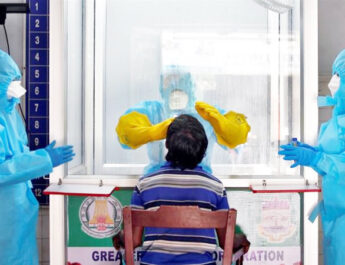From Our Bureau
NEW DELHI: The Supreme Court on Tuesday said that there is no absolute concept of “biological man and woman”. The top court’s observation came while hearing a batch of pleas seeking legal validation of same-sex marriages.
The top court has constituted a five-judge Constitution bench to hear the matter, comprising Chief Justice DY Chandrachud, Justices Sanjay Kishan Kaul, Ravindra Bhat, Hima Kohli and PS Narasimha.
“There is no absolute concept of a man or an absolute concept of a woman at all,” CJI Chandrachud said after Solicitor General Tushar Mehta, appearing for the Centre, submitted that the Special Marriage Act’s intent has been for the relationship between a “biological male and biological female”.
“It’s not the question of what your genitals are. It’s far more complex, that’s the point. So even when Special Marriage Act says man and woman, the very notion of a man and a woman is not an absolute based on genitals,” the Chief Justice said.
We need not reinvent the wheel,” senior advocate Mukul Rohatgi told a constitutional bench made up of five senior judges presided over by Chief Justice of India DY Chandrachud.
“The LGBTQ should have a right to a life of dignity and to the institution of marriage and family which is available to others,” Rohatgi added.
The Supreme Court has the task of examining several petitions from same-sex couples seeking the legalization of their marriages.
The petitions come five years after the court struck down a 150-year-old law from India’s colonial past under British rule that punished “unnatural offences” (gay sex) and criminalized same-sex relationships with jail sentences.
“We want privacy in our homes and not face stigma in public places,” Rohatgi continued.
“We want a declaration that we have a right to marry, that the right will be recognized by the State and will be registered under the Special Marriage Act. Once that happens, society will accept us. The stigma will only go once the state recognizes it,” the senior advocate said.
The Indian government has expressed its opposition to the collective lawsuit and has said that it should be the Indian parliament that decides on the legality of same-sex marriages.
Speaking on behalf of the government, Attorney General Tushar Mehta argued that this was not an issue to be debated by the constitutional court but rather parliamentarians.
KEY POINTS
Solicitor General Tushar Mehta told the SC that there is no legal lacuna in the Transgender Persons (Protection of Rights) Act and the question is not of granting a socio-legal sanction. He apprised the court that it has been clarified that none will discriminate against transgender persons. There are provisions of reservation for transgender, he said.
Senior advocate Mukul Rohatgi, representing the petitioners, said that the Supreme Court of India has always protected the right of inter-caste and inter-faith couples to marry a person of their choice. He said non-recognition of same-sex marriages amounted to discrimination that struck at the root of dignity and self-fulfillment of LGBTQIA+ couples. LGBTQ+ citizens form 7 to 8 per cent of the population of the country. Rohatgi extensively cited judgments of the apex court in Navtej Johar which decriminalised homosexual acts and Puttaswamy judgment which emphasised on right to privacy and right to choice and choose.
Rohatgi said the Special Marriage Act is ultra vires the Constitution of India to the extend it discriminates between same-sex couples and opposite-sex couples denying same-sex couples both legal rights like adopting and inheriting property as well the social recognition and status.
Chief Justice said that they have to find a legislative void or vacuum and issue a declaration, or directive to find modalities for implementing the same-sex marriages in existing law. “What about issuing a declaration or directive to the legislature? Can we issue a declaration,” Justice Kaul asked.
Responding to them, Rohatgi said, “Life is passing. How long will we wait? This court shall directly bring in the law.”
CJI said during the hearing, “We have to exercise our interpretative power in an incremental manner. have to mindful that court will do it in the way of interpretation and going incrementally we can cover a canvas for the present… confine yourself to the incremental canvas and then allow Parliament to respond to the evolution of the society. We cannot deny the fact that parliament is indeed relevant here. There is also a legislative process involved.”
CJI added, “Some acceptance is evolving after Navtej Johar case. For time being, can we not step into personal laws at all and restrict to Special Marriage Act by giving it a gender-neutral interpretation and evolve a civil union concept? From the Navtej case till now there has been acceptance of same-sex relationships… which is also universities and in this evolving consensus court is playing a dialogical role and we know about our limitations.”
Justice Kaul said that “Rohatgi says Special Marriage Act status itself will give them right to marry and if at all other issues need to be addressed or not needs to be seen… as CJI says sometimes incremental changes in society is a better way as there is always a better time to address these…As the CJI said can we for the time being don’t step into personal laws and just weave same-sex marriage into Special Marriage Act.”
SG Mehta, appearing for the Centre, said Hindus and Muslims will be affected. “Several communities, and religious denominations will have to be consulted and personal laws have to be examined.”
The Supreme Court said, “We are not examining personal laws. We will only examine if same-sex marriages can be weaved into Special Marriage Act through interpretations.”
###





